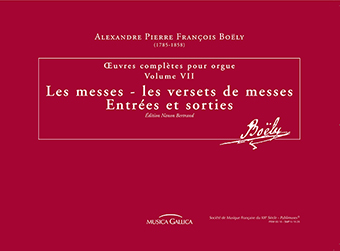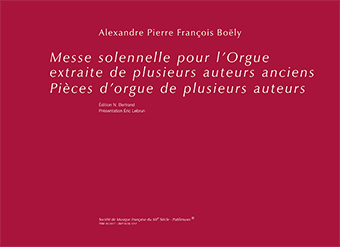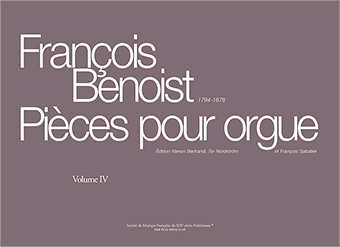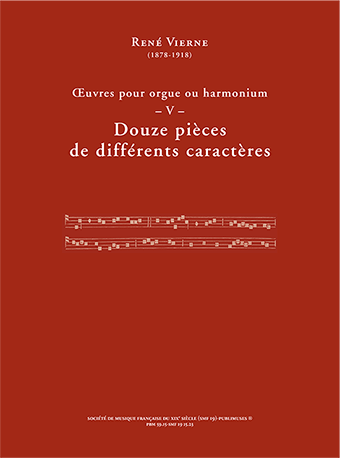News updated on December 30th 2020
Advertisements
Published in 2020
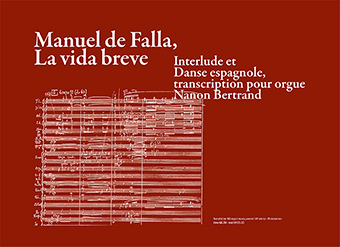
Manuel de Falla
La Vida breve — Interlude and Spanish dance
Transcription for Great Organ
Ref. PBM 66.20-SMF19 23.32
Transcription for Great Organ by Nanon Bertrand.
Interlude (Act II, 1st tableau, scene 3) and Spanish Dance (Act II, 2nd tableau, scene 1 and finale) for Orchestra.
Yves Gérard
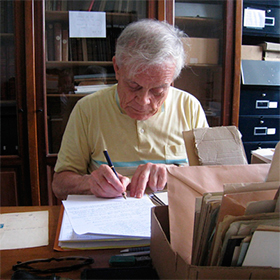
It is with great sadness that we inform you of the death of Yves Gérard on October 6th 2020 at the age of 88.
He was since 2007 vice-president of the “new” Société de Musique Française du 19e siècle (smf19), which was formed from Publimuses®, itself founded in 1992. He was the good genius of all the activities of both entities, giving his unstinting advice, ideas, remarks and, above all, encouragement. We will remember his fine taste and sound judgement, and his every word carried value.
Yves Gérard leaves a very great void. By continuing our work to highlight the French organ music heritage, in accordance with his advice, we will keep a lasting memory of him and honour his memory.
Coming soon
Alexis Chauvet
New edition:
9 Offertoires de caractères gradués pour l’Avent et le temps de Noël
+ Pièces diverses
+ Transcriptions of piano pieces for Great Organ
In progress
Alexandre Pierre François Boëly
Œuvres complètes pour orgue
Volume VIII
Les hymnes, les antiennes, les proses
Alexandre Pierre François Boëly
Cantiques et motets pour une voix et accompagnement
trois voix égales et/ou mixtes avec accompagnement d'orgue ou de pianoforte
—
Gabriel Fauré
6e Nocturne op. 63 for piano
Transcription for Great Organ by Nanon Bertrand
News updated on May 20th 2019
Parutions
Management / Distribution

On October 3, 2018, the Boëllmann-Gigout association, chaired by Mr. Thierry Adhumeau, entrusted SMF19-Publimuses with the management and distribution of the music scores from its catalogue.
Works of Auguste Fauchard, Daniel Roth, Jean Steinmetz
—
Auguste Fauchard
Symphonie eucharistique
Ref. B.G.2010.05
With the Eucharistic Symphony, canon Fauchard clearly transcends his models Vierne, Widor, Dupré; the elegance of the writing, often suave, sometimes sensual, the refinement of the timbres, make this ample monument a masterpiece of organ literature of the 20th century. This vast symphonic fresco delivers three musical meditations on the Eucharist: Lauda Sion, Pange lingua et Adoro te.
—
Daniel Roth
Livre d'orgue pour le Magnificat
Hommage au facteur d'orgues A. Cavaillé-Coll
volume I
Ref. B.G.2007.03
Daniel Roth
Livre d'orgue pour le Magnificat
Hommage au facteur d'orgues A. Cavaillé-Coll
volume II
Ref. B.G.2011.06
Composed between 1998 and 2010, the Organ Book for the Magnificat appears as one of the musician's masterpieces. Daniel Roth revives here a French Marian tradition of the 17th and 18th centuries, taken up by Léon Boëllmann at the end of the 19th century and by Marcel Dupré in the 20th century. But the compositional approach on the one hand, and the scale of the pieces on the other hand are very different: these are no longer verses that are interspersed between the master's interventions to comment on them. It is to the sacred instrument alone that the singing, the commentary, but also the theological reflection are entrusted in order to magnify each of the ten verses of the Magnificat. If each part of the cycle is dedicated to a friend of the composer, it is a tribute to Cavaillé-Coll, the sound ideal of the Organ Book for the Magnificat being naturally that of the great organ of St. Sulpice. A symphonic instrument, even of modest size, is perfectly suited to the performance of these pieces.
—
Jean Steinmetz
Carillon pour Grand Orgue
Ref. B.G.2017.12
Written in 1980 and dedicated to “In memory of Louis Vierne and in memory of Léonce de Saint-Martin”, this piece, without being entirely a pastiche, cannot fail to recall the style of the famous Westminster Carillon of Vierne, at the same time as that of his direct successor, Léonce de Saint-Martin, by certain harmonies and modulations concessions quite specific to the latter. Jean Steinmetz premiered the work on June 10, 1984 during a recital given on the prestigious Cavaillé-Coll in Notre-Dame de Paris.
Published in 2019
Ref. PBM 60.16-18.28
For Saint-Gervais: Masses and verses for “Annuels ou Solemnels majeurs” (Cunctipotens), “Grands solennels” (Dumont), “Solemnels mineurs” (De Angelis).
For Saint-Germain l'Auxerrois: Organ verses in plainsong in 4 parts: Messe de Dumont pour les Grands solemnels, Messe des Annuels, Messe des Solemnels mineurs, Messe des Doubles majeurs “in the J.S. Bach style”.
Two masses with figured bass: for Doubles mineurs, for Sundays and semi-doubles.
Entrances and sorties; single verses.
News updated on July 30th 2018
Publications
Published in 2018
Ref. PBM 46.0817-SMF19 08.1217
Technical info Presentation Éric Lebrun in French and English. Preface Nanon Bertrand in French and English. One volume 225 x 310 landscape. 92 pages.
New edition of Messe solennelle (Kyrie, Gloria Cunctipotens with “faux-bourdons”) augmented by a set of Pièces d'orgue par des auteurs divers (Organ Pieces by various authors). As for the Messe solennelle, Boëly mixes pieces of his own and pieces that he transposes for the organ. These pieces — which come from our collections of manuscripts — by Boëly and Haendel, illustrate a Kyrie and Gloria of the Mass Cunctipotens. Boëly adds an Offertory by C.P.E. Bach, and two hymns for Easter time by himself and Albrechtsberger.
Many facsimiles complete the publication.
Coming Soon
Alexandre Pierre François Boëly
Œuvres complètes pour Orgue
Volume VII
Les messes, les versets de messes, entrées, sorties
Ref. PBM 60.16-18.28
For Saint-Gervais: Masses and verses for “Annuels ou Solemnels majeurs” (Cunctipotens), “Grands solennels” (Dumont), “Solemnels mineurs” (De Angelis).
For Saint-Germain l'Auxerrois: Organ verses in plainsong in 4 parts: Messe de Dumont pour les Grands solemnels, Messe des Annuels, Messe des Solemnels mineurs, Messe des Doubles majeurs “in the J.S. Bach style”.
Two masses with figured bass: for Doubles mineurs, for Sundays and semi-doubles.
Entrances and sorties; single verses.
In Progress
Alexandre Pierre François Boëly
Œuvres complètes pour orgue
Volume VIII
Les hymnes, les antiennes, les proses
Alexandre Pierre François Boëly
Cantiques et motets pour une voix et accompagnement
trois voix égales et/ou mixtes avec accompagnement d'orgue ou de pianoforte
Each canticle or motet in separate fascicle.
—
René Vierne
Deux motets pour chœur à 4 voix mixtes SATB et orgue
—
French music for saxo alto (or clarinet) and organ: works by G. Fauré, A. Guilmant, J. Massenet, M. Ravel, C. Saint-Saëns...
News updated on June 30th 2017
Publications
Published in 2017
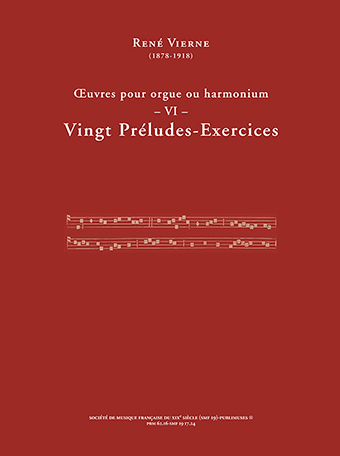
René Vierne
Volume VI
Vingt Préludes-Exercices pour orgue ou harmonium
Substitutions, glissés, liaisons des octaves, doigtés par renversement, articulation des accords, notes répétées, staccato, ornements, expression.
Ainsi que René Vierne l'écrit dans l'avant-propos de la Méthode : « Cette méthode s'adresse aux personnes ayant déjà une certaine pratique du piano [...] et peut servir, sans aucune suppression ni adjonction, à l'étude des claviers manuels de l'orgue à tuyaux. »
Coming soon
Alexandre Pierre François Boëly
Messe solennelle pour l'Orgue extraite de plusieurs auteurs anciens
Pièces d'orgue de plusieurs auteurs
Ref. PBM 46.0817-SMF19 08.1217
Edition N. Bertrand, 88 pages.
In Progress
Alexandre Pierre François Boëly
Œuvres complètes pour orgue
Volume VII
Les messes, les versets de messes
Œuvres complètes pour orgue
Volume VIII
Les hymnes, les antiennes, les proses
Cantiques et motets pour une voix et accompagnement
trois voix égales et/ou mixtes avec accompagnement d'orgue ou de pianoforte
Chaque cantique ou motet en fascicule séparé.
—
René Vierne
Deux motets pour chœur à 4 voix mixtes SATB et orgue
News updated on June 23rd 2016
Concerts
October 9th 2016
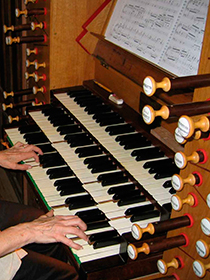
October 9th, 2016, 16:00.
Organ Recital, Nanon Bertrand.
Chapelle de la Salpétrière — 47 boulevard de l'Hôpital — 75013 Paris.
Program: Dietrich Buxtehude, Alexis Chauvet, A.P.F. Boëly, Max Reger.
July 17th 2016
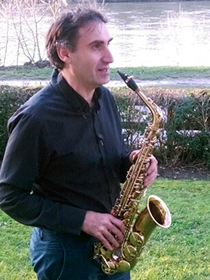
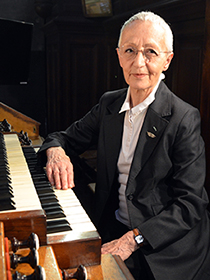
July 17th, 2016, 21:00.
Alto saxophone (Sébastien Tranchant) + organ (Nanon Bertrand) conert.
Église Notre-Dame du Port — Port-Joinville — Île d'Yeu (Vendée)
Saxo & organ program: Guy de Lioncourt, Gabriel Fauré, Jean Rivier, Alexandre Guilmant, Max Reger.
Organ program: Alexis Chauvet, Gabriel Pierné, Max Reger.
News updated on June 23rd 2016
Publications
In progress
Alexandre Pierre François Boëly
Œuvres complètes pour orgue
Volume VII
Les messes, les versets de messes
Œuvres complètes pour orgue
Volume VIII
Les hymnes, les antiennes, les proses
Canticles and motets for one voice and accompaniment, three voices with accompaniment of organ or pianoforte. Each canticle or motet in separate fascicle.
—
René Vierne
Œuvres pour orgue et orgue expressif
Volume VI
20 Préludes-excercices
Deux motets pour chœur à 4 voix mixtes SATB et orgue
News updated August 7th 2015
Concert
11 september 2015
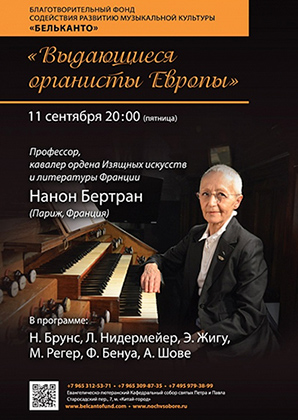
Nanon Bertrand, Organ Recital, September 11th, 2015, 20:00.
Lutheran Cathedral Peter and Paul — Starossadsky Pereoulok, 7/10 — Moscow 101000.
Metro: Lubjanka (lines 1 and 7) or Kitaj-Gorod (lines 6 and 7).
Program: Bruhns, Niedermeyer, Chauvet, Gigout, Boëly, Reger.
News updated August 7th 2015
Publications
Published in 2015
In progress
Alexandre Pierre François Boëly
Volume VII
Les messes, les versets de messes
Volume VIII
Les hymnes, les antiennes, les proses
Cantiques et motets pour une voix et accompagnement, trois voix égales et/ou mixtes avec accompagnement avec accompagnement d'orgue ou de pianoforte
—
René Vierne
Deux motets pour chœur à 4 voix mixtes SATB et orgue
2014
In memoriam
René Vierne
In this year 2014 began the commemorations from the war of 1914-1918.
When war was declared, René Vierne left for the battle front on 8 August 1914. In spite of the ordeals of the war, his letters testify to the existence of intense musical activity. While at the front he had the use of a piano, composed and performed chamber and vocal works with his fellow soldiers. He often wrote to his brother but, following the death on active service on 12 November 1917 of his young nephew Jacques (Louis's son), René no longer felt the same warlike spirit which inspired all the soldiers who had left for the front. He felt bitter about these events which took away one of the members of his farnily.
The “little corporal”, “decorated with the War Cross (bronze star), of the seventh company of the 414th Infantry Regiment, number 3220, recruited by the 6th Bureau (Seine), died at Plateau de Branscourt (Marne) on 29 May 1918, died for his country!”
When the letters of René remain unknown to us, several letters of Lucien Durosoir (1878-1955, violinist), another musician of the front, speak about the soldier Vierne:
“[...] The concert in Noyon is postponed until Sunday 30 December. [...] On 23 [December] at Noyon there is a Christmas tree given by a Rothchild (sic) baroness who will be there with several people from the main bank in Noyon. [...] Mayer and I will be the violinists, and Cronet who is at Ham with the Engineers and who plays at the Opéra-Comique; Goupil from the Opera, who is in Noyon and makes a right hash of things — the word is quire appropriate. Then there is Broassard and someone else l don't know. The viola player is a comrade from the 6th Division, and Niverd plays the viola as well! Maréchal is the cellist as well as another player from Noyon, the double bass is played by Delmas and Fleury is the flautisr. Vierne is at the organ, the brother of the well-known organist, and the pianist is Magne.” Letter from Lucien Durosoir to his mother, 18 December 1917.
“I''m going to Ham soon, by car of course, to fetch the music that Vierne brought during his leave...” Letter from L. Durosoir, 20 December 1917.
“We have heard about the death of the brother of Vierne, who was in the 26th Territorial Company. He was killed by an exploding shell, during the execution of a task in an active sector. I made his acquaintance at Ham, he was due to come to Noyon on 30 December to play the organ. The departure of his regiment meant that we had to invite Paray.” Letter from L. Durosoir, 22 June 1918.
In 1918 Louis Vierne composed the poetic piano piece, Solitude, op 44, “to the memory of my brother René”.
Copyright © 2008-2023 Société de Musique française du 19e siècle — Publimuses®

